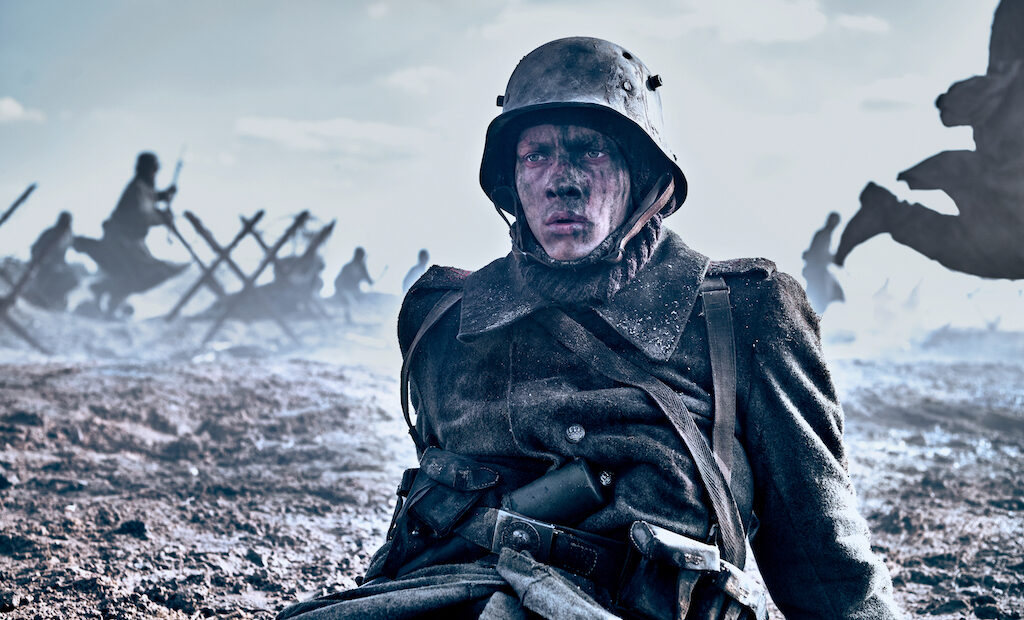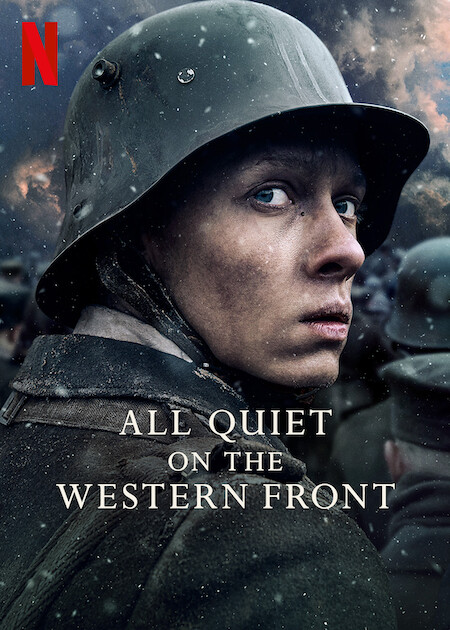All Quiet on the Western Front

Remarkably, Edward Berger’s All Quiet on the Western Front marks the first German adaptation (after Lewis Milestone’s 1930 Academy Award-winning film and Delbert Mann’s 1979 television movie) of Erich Maria Remarque’s 1929 source material of the same name. A towering achievement of German literature, Remarque’s All Quiet on the Western Front, along with its 1930 sequel, The Road Back, broke the ground for the brutality and honesty that has characterised much of the war genre’s literary and cinematic entries since. The novel and its sequel were targets of Nazi book burnings in 1930s Germany, such was their powerful deconstruction of the senselessness of war. Nine decades later, Berger’s All Quiet on the Western Front feels less urgently innovative, but just as unflinching.
Following the plot outline established in Remarque’s novel, the production explores the savagery of war through the uninitiated, youthful naivety of Paul Bäumer (played by Felix Kammerer) whose chalky, jagged facial features are manipulated to ghostly, chilly effect in an astute piece of casting. Having bought into the romantic perception of war as a manifestation of noble patriotism, Paul lies about his age (he is just shy of 18) in order to enlist alongside his friends, all of whom are overcome with the notion that, through warfare, they can make a name for themselves as men (the officer who hands Paul his uniform tells him that his father can now be proud of him). As audiences in 2022 are more than familiar with the beats and oscillations of such genre outings, it is no surprise that the reality of war rapidly overwhelms them. Paul, however, having survived his first experience on the frontline, befriends Stanislaus “Kat” Katczinsky (Albrecht Schuch), an older serviceman, who becomes a mentor figure. The illiterate veteran commissions Paul to read him his letters sent from his wife, while he assists his young friend in the purloining of a goose from a local farmer.
Berger’s faithful version of the story is cast in the Saving Private Ryan mould, and adequately transposes the latter’s brutality to the battles of World War I, while every filmmaking calculation is made with the intention of presenting warfare as an affront to the natural order of things. The film’s very first scene depicts a family of fox cubs and their mother in a quiet French field, only to be disturbed by the sound of encroaching gunfire. Berger then opts for a sweeping aerial-to-ground tracking shot as an introduction to the battleground, putting warfare into a perspective that highlights its futility, while James Friend’s icy, desaturated photography turns the French countryside into a bleak setting, devoid of life.
While the viscerality is effective, the dramatic elements aren’t quite as confidently executed. Parallel to Paul’s frontline narrative is one of the bureaucracy and politicking of the latter stages of the war, with Daniel Brühl’s Matthias Erzberger seeing the writing on the wall and actively campaigning for an armistice. It can sometimes feel like an insufficiently fleshed-out afterthought in the script, while some characters in the trenches seem equally thinly conceived, although this can perhaps be explained away by the dehumanising impact of their experience – a world where you are a uniform before you are a person.
All Quiet on the Western Front is nevertheless a film with the senselessness of war at its core. It may not be a radical evaluation, but it’s one that portrays the raw barbarism as effectively as the best of them.
Matthew McMillan
All Quiet on the Western Front is released in select UK cinemas on 14th October 2022 and available on Netflix on 28th October 2022.
Watch the trailer for All Quiet on the Western Front here:
























Facebook
Twitter
Instagram
YouTube
RSS